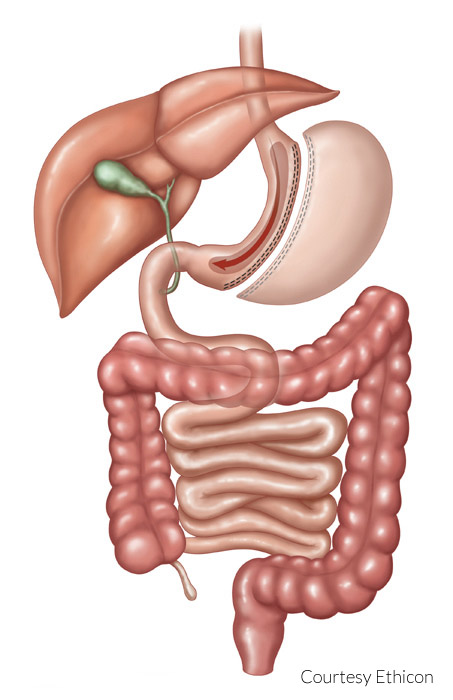Sleeve Gastrectomy / Gastric Sleeve Surgery
 The gastric sleeve, or sleeve gastrectomy, is a surgical weight loss procedure that removes a portion of the stomach, limiting the amount of food that a patient can consume on a daily basis, and in turn promoting weight loss. The procedure gets its name because it uses a stapling device to create a thin “sleeve” of stomach. Once this has been created, the remaining part of the stomach is removed from the body. It is currently the most popular weight loss surgery in the United States.
The gastric sleeve, or sleeve gastrectomy, is a surgical weight loss procedure that removes a portion of the stomach, limiting the amount of food that a patient can consume on a daily basis, and in turn promoting weight loss. The procedure gets its name because it uses a stapling device to create a thin “sleeve” of stomach. Once this has been created, the remaining part of the stomach is removed from the body. It is currently the most popular weight loss surgery in the United States.
Unlike gastric banding, the sleeve gastrectomy is not reversible. One of the benefits of this procedure, over gastric bypass, is that the digestive tract is not disrupted, allowing nutrients to be fully absorbed into the body following the procedure. Patients who undergo sleeve gastrectomy not only experience significant weight loss, but also decrease their risk for serious illnesses such as high blood pressure, sleep apnea, and diabetes.
The Benefits of Sleeve Gastrectomy
Bariatric surgery and subsequent weight loss can have a tremendous effect on your emotional and physical well-being. New, laparoscopic procedures such as the sleeve gastrectomy are safer and less invasive than ever before. In addition to helping patients regain their health, these procedures offer the following benefits:
- Up to 55 percent of excess weight loss
- Faster recovery time due to laparoscopic method
- Reduced risk for diabetes, heart disease, high blood pressure, high cholesterol and sleep apnea
- Long life expectancy
- Increased comfort and energy
- Increased self-confidence
- Cost-effective due to decreased prevalence of other health problems
- Fewer dietary limitations when compared to gastric bypass
- No medical device needs to be implanted
- Possibility of feeling fewer hunger pangs
The Procedure
Recovery After Gastric Sleeve
Following gastric sleeve surgery your hospital stay will last from one to three days. This time frame is based on how quickly the patient recovers. Most patients can return to their normal routines within four to six weeks. Patients should avoid strenuous activity until cleared by our office.
Risks and Complications of Gastric Sleeve Surgery
The gastric sleeve, by and large, presents few risks and complications above those associated with any type of surgery. These may include
- Weight Regain: The stomach pouch may stretch over time, potentially leading to overeating and weight regain.
- Vitamin Deficiencies: The gastric sleeve may reduce the secretion of intrinsic factor and in turn the absorption ofvitamin B-12. Patients may need a multi-vitamin and B-12 supplement.
Other Post-operative Complications
Patients will also be monitored closely for the following complications to ensure they are treated promptly. Certain complications may require a revisional surgery to correct.
- Staple line problems, leading to stomach acid leakage
- Strictures
- Blood clots
- Infection
- Reflux
